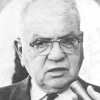Harold Urey

Harold Urey
Harold Clayton Ureywas an American physical chemist whose pioneering work on isotopes earned him the Nobel Prize in Chemistry in 1934 for the discovery of deuterium. He played a significant role in the development of the atom bomb, but may be most prominent for his contribution to theories on the development of organic life from non-living matter...
NationalityAmerican
ProfessionScientist
Date of Birth29 April 1893
CountryUnited States of America
cents constants differ exchange few lighter nearly per reactions
In general, exchange reactions for the lighter isotopes have equilibrium constants sufficiently different from unity, so that the ratios of concentrations of the isotopes in two compounds which are in equilibrium differ by a few per cents in nearly all cases.
branches chemical discovery efficient field hydrogen major marked method opened physical properties science separation several
The discovery of deuterium and the marked differences in the physical and chemical properties of hydrogen and deuterium, together with an efficient method for the separation of these isotopes, have opened an interesting field of research in several of the major branches of science.
determination explore expression great impossible insistent nearly program scientific space
The space program is not only scientific in purpose but also is an expression of man's insistent determination to do the nearly impossible - to explore the unknown, even at great risk.
pittsburgh
I'm in Pittsburgh. Why am I here?
cities feet history
Athens built the Acropolis. Corinth was a commercial city, interested in purely materialistic things. Today we admire Athens, visit it, preserve the old temples, yet we hardly ever set foot in Corinth.